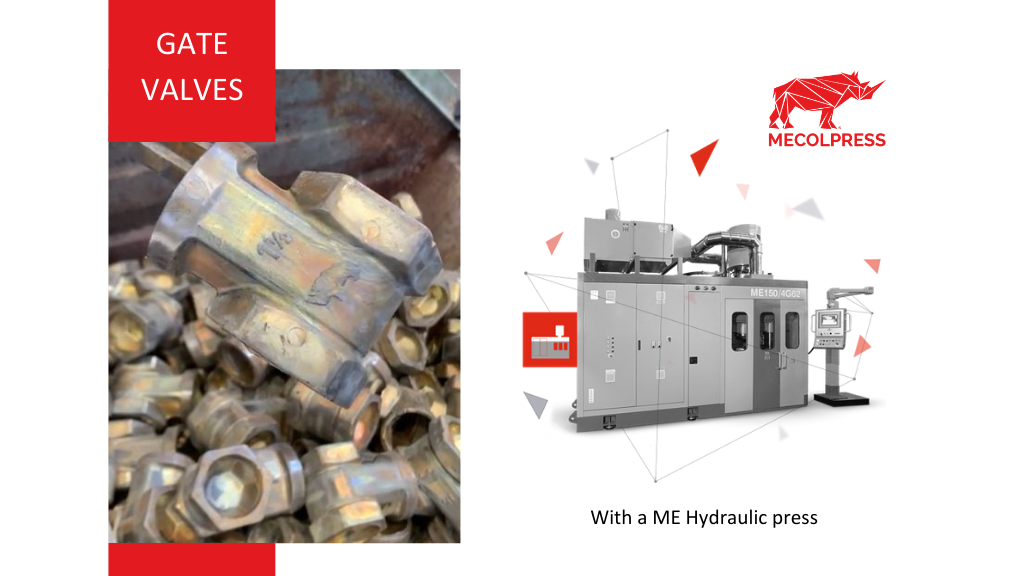
Forge gate valves with a ME Hydraulic press!
In this video you can see the hot forging of gate valves with a ME hydraulic press.
Go beyond the normal criticality of the forging of these valves, get a piece without flash and reduce production costs.
What are gate valves and how they are traditionally forged?
The brass or other materials gate valves have the function of fluid flow adjusting and stopping onto a tube. They fulfil this control through a hand wheel (or a motorized actuator).
To give you an idea, you can compare the function of the mentioned valve to the closing of a gate slide in the middle of a tunnel flooded by the water.
Usually the gate valves are hot forged through traditional eccentric mechanical presses, but their realization is not easy, above all if you want to forge the part without possible defects, using little material (therefore with the most possible depth of all the holes) or without flash as well.
The traditional forging of gate valves by means of eccentric mechanical presses requires a greater energy compared to the one necessary for forging of ball valves having the same dimensions, and it requires a much higher punches stroke, in particular for one of them.
For example, for the realization of gate valves of 2 inches or more, eccentric mechanical presses of minimum 450 tons capacity and a forging tool (defined as bell tool) that allows the realization of holes of great diameter are normally used.
This technology has been valid and successfully used for many years, and Mecolpress as well proposes it to its customers through its SEO and SEO CVE CS presses series.
Gate valves forged by means of hydraulic presses
There is also a much more efficient way for gate valves hot forging: ME hydraulic press.
ME hydraulic presses, in fact, thanks to the different working dynamics of the punches, are proving to be really decisive for all the forgings of more “problematic” and complex parts, consenting for example to avoid the use of EV bell tool.
As we show in this video by means of ME presses you can forge high quality gate valves, without flash, detail of great importance. The presence of flash in the forged parts implicates a considerable waste of material, and moreover, to remove it, it is necessary to use a trimming press, which means therefore that you will have to equip yourself with an additional machine.
Another interesting aspect to be underlined is the fact that hydraulic presses have a cycle frequency significantly higher than normal mechanical presses.
Our ME hydraulic presses have also as standard equipment the Calipso software, our innovative program for collecting and checking forging data. Through this intelligent system you can perform analyses of the production process, but not only! In fact, it is possible to obtain an optimal and separate management of any pieces to be discarded or otherwise to be evaluated.
The checking of the pieces carried out by Calipso guarantees the certified quality of each piece produced.
Another important advantage that is standard on our ME hydraulic presses is the innovative die lubrication system, that can also be optionally applied to eccentric continuous cycle presses. In hot forging it is important not to underestimate the way in which the dies are lubricated; finding the “perfect” lubrication in your forging process ensures an increase in the life of the dies and materials unattainable with traditional systems!
The ME hydraulic press has an innovative forging system compared to traditional mechanical presses. Innovative because, for example, it does not generate mechanical shocks, it considerably reduces the noise generated during production, the tooling is much faster and more convenient.
Here is the video of the forged gate valves with ME hydraulic press:
The advantages of using hydraulic presses in gate valves hot forging
In summary, why should you choose a hydraulic press to forge gate valves?
- No bell EV tool,
- Gate valve without flash,
- Forged pieces controlled by the powerful Calipso software,
- Separate management of non-compliant parts,
- Better forging lubrication system,
- No mechanical shock,
- Less noise,
- More setup speed.
